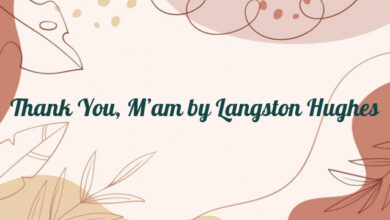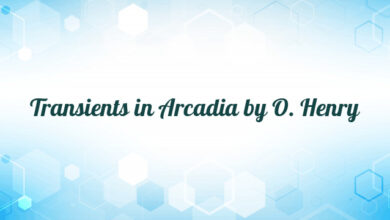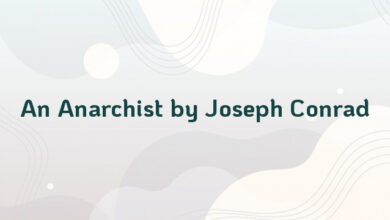
T.S. Arthur Both to Blame
“Of course, both are to blame.”
“Of course. You may always set that down as certain when you see two persons who have formerly been on good terms fall out with each other. For my part, I never take sides in these matters. I listen to what both have to say, and make due allowance for the wish of either party to make his or her own story appear most favorable.”
Thus we heard two persons settling a matter of difference between a couple of their friends, and it struck us at the time as not being exactly the true way in all cases. In disputes and differences, there are no doubt times when both are equally to blame; most generally, however, one party is more to blame than the other. And it not unfrequently happens that one party to a difference is not at all to blame, but merely stands on a just and honorable defensive. The following story, which may or may not be from real life, will illustrate the latter position.
“Did you hear about Mrs. Bates and Mrs. Tarleton?” said one friend to another.
“No; what is the matter?”
“They are up in arms against each other.”
“Indeed; it’s the first I’ve heard of it. What is the cause?”
“I can hardly tell; but I know that they don’t speak. Mrs. Tarleton complains bitterly against Mrs. Bates; and Mrs. Bates, they say, is just as bitter against her. For my part, I’ve come to the conclusion that both are to blame.”
“There is no doubt of that. I never knew a case of this kind where both were not to blame.”
“Nor I.”
“But don’t you know the ground of the difference?”
“They say it is about a head-dress.”
“I’ll be bound dress has something to do with it,” grumbled out Mr. Brierly, the husband of one of the ladies, who sat reading a newspaper while they were talking.
“My husband is disposed to be a little severe on the ladies at times, but you musn’t mind him. I never do,” remarked Mrs. Brierly, half sarcastically, although she looked at her husband with a smile as she spoke. “He thinks we care for nothing but dress. I tell him it is very well for him and the rest of the world that we have some little regard at least to such matters. I am sure if I didn’t think a good deal about dress, he and the children would soon look like scarecrows.”
Mr. Brierly responded to this by a “Humph!” and resumed the perusal of his newspaper.
“It is said,” resumed Mrs. Brierly, who had been asked to state the cause of the unhappy difference existing between the two ladies, “that Mrs. Bates received from her sister in New York a new and very beautiful head-dress, which had been obtained through a friend in Paris. Mrs. Tarleton wanted it very badly, and begged Mrs. Bates for the pattern; but she refused to let her have it, because a grand party was to be given by the Listons in a few weeks, and she wanted to show it off there herself. Mrs. Tarleton, however, was not going to take ‘no’ for an answer; she had set her heart upon the head-dress and must have it. You know what a persevering woman she is when she takes anything into her head. Well, she called in almost every day to see Mrs. Bates, and every time she would have something to say about the head-dress, and ask to see it. In this way she got the pattern of it so perfectly in her mind that she was able to direct a milliner how to make her one precisely like it. All unknown to Mrs. Bates, Mrs. Tarleton came to the party wearing this new style of head-dress, which made her so angry when she discovered it, that she insulted Mrs. Tarleton openly, and then retired from the company.”
“Is it possible!”
“That, I believe, is about the truth of the whole matter. I have sifted it pretty closely.”
“Well, I declare! I was at the party, but I saw nothing of this. I remember Mrs. Tarleton’s head-dress, however, very well. It certainly was very beautiful, and has become quite fashionable since.”
“Yes, and is called by some the Tarleton head-dress, from the first wearer of it.”
“This no doubt galls Mrs. Bates severely. They say she is a vain woman.”
“It is more than probable that this circumstance has widened the breach.”
“I must say,” remarked the other lady, “that Mrs. Tarleton did not act well.”
“No, she certainly did not. At the same time, I think Mrs. Bates was served perfectly right for her selfish vanity. It wouldn’t have hurt her at all if there had been two or three head-dresses there of exactly the pattern of hers. But extreme vanity always gets mortified, and in this case I think justly so.”
“Besides, it was very unladylike to insult Mrs. Tarleton in public.”
“Yes, or anywhere else. She should have taken no notice of it whatever. A true lady, under circumstances of this kind, seems perfectly unaware of what has occurred. She shuns, with the utmost carefulness, any appearance of an affront at so trivial a matter, even if she feels it.”
Such was the opinion entertained by the ladies in regard to the misunderstanding, as some others called it, that existed between Mrs. Bates and Mrs. Tarleton. Both were considered to blame, and nearly equally so; but whether the parties really misunderstood their own or each other’s true position will be seen when the truth appears.
Mrs. Bates did receive, as has been stated, a beautiful head-dress from a sister in New York, who had obtained it from a friend in Paris. The style was quite attractive, though neither unbecoming nor showy. Mrs. Bates had her own share of vanity, and wished to appear at a large party soon to take place, in this head-dress, where she knew it must attract attention. Although a little vain, a fault that we can easily excuse in a handsome woman, Mrs. Bates had a high sense of justice and right, and possessed all a lady’s true delicacy of feeling.
The head-dress, after being admired, was laid aside for the occasion refrered to. A few days afterwards, Mrs. Tarleton, an acquaintance, dropped in.
“I have something beautiful to show you,” said Mrs. Bates, after she had chatted awhile with her visitor.
“Indeed! What is it?”
“The sweetest head-dress you ever saw. My sister sent it to me from New York, and she had it direct from a friend in Paris, where it was all the fashion. Mine I believe to be the only one yet received in the city, and I mean to wear it at Mrs. Liston’s party.
“Do let me see it,” said Mrs. Tarleton, all alive with expectation. She had an extravagant love of dress, and was an exceedingly vain woman.
The head-dress was produced. Mrs. Tarleton lifted her hands and eyes.
“The loveliest thing I ever saw! Let me try it on,” she said, laying off her bonnet and taking the head-dress from the hands of Mrs. Bates. “Oh, it is sweet! I never looked so well in anything in my life,” she continued, viewing herself in the glass. “I wish I could beg it from you; but that I havn’t the heart to do.”
Mrs. Bates smiled and shook her head, but made no reply.
“Here, you put it on, and let me see how you look in it,” went on Mrs. Tarleton, removing the cap from her own head and placing it upon that of her friend. “Beautiful! How well it becomes you! you must let me have the pattern. We can wear them together at the party. Two will attract more attention than one.”
“I am sorry to deny you,” replied Mrs. Bates, “but I think I shall have to be alone in my glory this time.”
“Indeed, you must let me have the pattern, Mrs. Bates. I never saw anything in my life that pleased me so much, nor anything in which I looked so well. I have been all over town for a head-dress without fnding anything I would wear. If you don’t let me have one like yours, I do not know what I will do. Come now, say yes, that is a dear.”
But Mrs. Bates said no as gently as she could. It was asking of her too much. She had set her heart upon appearing in that head-dress as something new and beautiful, and could not consent to share the distinction, especially with Mrs. Tarleton, for whom, although a friend, she entertained not the highest esteem, and for the reason that Mrs. Tarleton had rather a vulgar mind, and lacked a lady’s true perceptions of propriety.
“Well, I must say you are a selfish woman,” returned Mrs. Tarleton, good-humoredly, and yet meaning what she said. “It wouldn’t do you a bit of harm to let me have the pattern, and would gratify me more than I can tell.”
“I’ll tell you what I will do,” said Mrs. Bates, to this, with a reluctant effort that was readily perceived by her visitor, “I will give you the head-dress and let you wear it, as long as you seem to have set your heart so upon it.”
“Oh no, no; you know I wouldn’t do that. But it seems strange that you are not willing for us to wear the same head-dress.”
The indelicate pertinacity of her visitor annoyed Mrs. Bates very much, and she replied to this rather more seriously than she had before spoken.
“The fact is, Mrs. Tarleton,” she said, “this head-dress is one that cannot fail to attract attention. I have several very intimate friends, between whom and myself relations of even a closer kind exist than have yet existed between you and me. If I give you the pattern of this cap and the privilege of wearing it with me for the first time it is seen in this city, these friends will have just cause to think hard of me for passing them by. This is a reason that would inevitably prevent me from meeting your wishes, even if I were indifferent about appearing in it myself alone.”
“I suppose I must give it up, then,” said Mrs. Tarleton, in a slightly disappointed tone.
“As I said before,” returned Mrs. Bates, “I will defer the matter entirely to you. You shall have the head-dress and I will choose some other one.”
“Oh no; I couldn’t think of such a thing,” returned Mrs. Tarleton. “That is more than I ought to ask or you to give.”
“It is the best I can do,” Mrs. Bates said, with a quiet smile.
“Sister,” said Mrs. Tarleton, on returning home, “you can’t imagine what a sweet head-dress Mrs. Bates has just received from Paris through her sister in New York. It is the most unique and beautiful thing I ever saw. I tried hard for the pattern, but the selfish creature wouldn’t let me have it. She is keeping it for the Liston’s party, where it will be the admiration of every one.”
“What is it like?”
“Oh, I can’t begin to describe it. It is altogether novel. I wish now I had asked her to let me bring it home to show it to you.”
“I wish you had. You must go there again and get it for me.”
“I believe I will call in again to-morrow.–Perhaps she will have thought better of it by that time, and changed her mind. At any rate, if not, I will ask her to let me bring it home and show it to you.”
This was done. Mrs. Bates did not object to letting Mrs. Tarleton take the head-dress and show it to her sister, for she had the fullest confidence that she would not do anything with it that she knew was against her wishes, which had been clearly expressed.
The sister of Mrs. Tarleton was in raptures with the head-dress.
“It is right down mean and selfish in Mrs. Bates not to let you have the pattern,” she said. “What a vain woman she must be. I always thought better of her.”
“So did I. But this shows what she is.”
“If I were you,” remarked the sister, “I would have it in spite of her. It isn’t her pattern, that she need pretend hold it so exclusively. It is a Paris fashion, and any body else may get it just as well as she. She has no property in it.”
“No, of course not.”
“Then while you have the chance, take it to Madame Pinto and get her to make you one exactly like it.”
“I have a great mind to do it; it would serve her perfectly right.”
“I wouldn’t hesitate a moment,” urged the sister. “At the last party, Mrs. Bates managed to have on something new that attracted every one and threw others into the shade, I wouldn’t let her have another such triumph.”
Thus urged by her sister, Mrs. Tarleton yielded to the evil counsel, which was seconded by her own heart. The head-dress was taken to Madame Pinto, who, after a careful examination of it, said that she would make one exactly similar for Mrs. Tarleton. After charging the milliner over and over again to keep the matter a profound secret, Mrs. Tarleton went away and returned the head-dress to Mrs. Bates. It had been in her possession only a couple of hours.
Mrs. Pinto was a fashionable milliner and dress maker, and was patronized by the most fashionable people in the city, Mrs. Bates among the rest. The latter had called in the aid of this woman in the preparation of various little matters of dress to be worn at the party. Three or four days after Mrs. Tarleton’s visit to Mrs. Pinto with the head-dress, Mrs. Bates happened to step in at the milliner’s, who, during their consultation, about little matters of dress, drew the lady aside, saying–“I’ve got something that I know I can venture to show you.–It’s for the party, and the loveliest thing you ever saw.”
As she said this she took from a box a facsimile of Mrs. Bates’ own beautiful head-dress, and held it up with looks of admiration.
“Isn’t it sweet?” she said.
“It is the most beautiful head-dress I ever saw,” replied Mrs. Bates, concealing her surprise. “Who is it for?”
“It’s a secret, but I can tell you. It is for Mrs. Tarleton.”
“Ah! Where did she get the pattern?”
“I don’t know; she brought it here, but said she couldn’t leave it for the world. I had to study it all out, and then make it from my recollection of the pattern.”
“The pattern did not belong to her?”
“Oh, no. Somebody had it who was going to show it off at the party, she said; but she meant to surprise her.”
“Have you any new patterns for head-dresses not chosen by the ladies who have made selections of you for Mrs. Liston’s party?” asked Mrs. Bates, not seeming to notice the reply of Mrs. Pinto.
“Oh, yes, ma’am, a good many,” and half-a-dozen really handsome head-dresses were shown–none, however, that pleased her half so well as the one she was about throwing aside. She suited herself from the assortment shown her, and directed it to be sent home.
Mrs. Bates felt justly outraged at the conduct of Mrs. Tarleton, but she did not speak of what had taken place, except to one or two very intimate friends and to her husband. The evening of the party at length arrived. Mrs. Tarleton was there a little earlier than Mrs. Bates, in all the glory of her ungenerous triumph. The beautiful head-dress she wore attracted every eye, and in the admiration won by the display of her taste, she lost all the shame she had felt in anticipation of meeting Mrs. Bates, to whom her meanness and dishonesty would be at once apparent.
At length she saw this lady enter the parlors by the side of her husband, and noticed with surprise that her head-dress was entirely different from the one she wore. The truth flashed across her mind. Mrs. Pinto had betrayed her secret, and Mrs. Bates, justly outraged by what had occurred, had thrown aside her beautiful cap and selected another.
Now Mrs. Bates was a woman whom Mrs. Tarleton would be sorry to offend seriously, because her position in certain circles was undoubted, while her own was a little questionable. The fact that Mrs. Bates had declined wearing so beautiful a head-dress because she had obtained one of the same pattern by unfair means, made her fear that serious offence had been given, and dashed her spirits at once. She was not long left in doubt. Before ten minutes had elapsed she was thrown into immediate contact with Mrs. Bates, from whom she received a polite but cold bow.
Mrs. Tarleton was both hurt and offended at this, and immediately after the party, commenced talking about it and mis-stating the whole transaction, so as not to appear so much to blame as she really was. Mrs. Bates, on the contrary, said little on the subject, except to a few very intimate friends, and to those who made free to ask her about it, to whom she said, after giving fairly the cause of complaint against Mrs. Tarleton–“I spoke to her coldly because I wished our more intimate acquaintance to cease. Her conduct was unworthy of a lady, and therefore I cannot and will not consider her among my friends. No apologies, if she would even make them, could change the wrong spirit from which she acted, or make her any more worthy of my confidence, esteem or love.”
“But you will surely forgive her?” said one.
“The wrong done to me I am ready enough to forgive, for it is but a trifling matter; but the violation of confidence and departure from a truly honest principle, of which she has been guilty, I cannot forgive, for they are not sins against me, but against Heaven’s first and best laws.”
But that did not satisfy some. Persons calling themselves mutual friends strove hard to reconcile what they were pleased to call a misunderstanding in which “both were to blame.” But it availed not. To their interference, Mrs. Bates usually replied–“If it will be any satisfaction to Mrs. Tarleton to be recognized by me and treated kindly and politely in company, I will most cheerfully yield her all that; but I cannot feel towards her as heretofore, because I have been deceived in her, and find her to be governed by principles that I cannot approve. We can never again be on terms of intimacy.”
But it was impossible to make some understand the difference between acting from principle and wounded pride. The version given by Mrs. Tarleton was variously modified as it passed from mouth to mouth, until it made Mrs. Bates almost as much to blame as herself, and finally, as the coldness continued until all intercourse at last ceased, it was pretty generally conceded, except by a very few, that “both were about equally to blame.”
The reader can now make up his own mind on the subject from what has been related. For our part, we do not think Mrs. Bates at all to blame in at once withdrawing herself from intimate association with such a woman as Mrs. Tarleton showed herself to be, and we consider that a false charity which would seek to interfere with or set aside the honest indignation that should always be felt in similar cases of open betrayal of confidence and violation of honest and honorable principles.
We have chosen a very simple and commonplace incident upon which to “hang a moral.”–But it is in the ordinary pursuits of business and pleasure where the true character is most prone to exhibit itself, and we must go there if we would read the book of human life aright.




